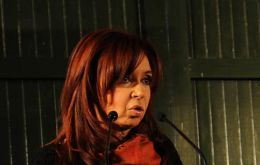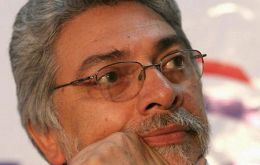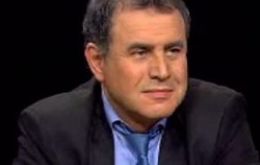MercoPress. South Atlantic News Agency
Economy
-
Thursday, June 3rd 2010 - 05:52 UTC
Mrs Kirchner defends ‘imports’ restrictions’; blames the media for the coverage

President Cristina Fernandez de Kirchner once again rejected that Argentina has adopted restrictions on imports, although she admitted “there isn't a country in the world that, through fiscal promotions or tariffs, doesn't have those mechanisms” of barriers for the entry of foreign products.
-
Thursday, June 3rd 2010 - 05:47 UTC
Canada, first G7 member to raise basic interest rate

Canada has become the first member of the G7 group of industrialised nations to raise interest rates since the global financial crisis. The Bank of Canada has increased its key lending rate by one quarter of a percentage point to 0.5%.
-
Wednesday, June 2nd 2010 - 03:36 UTC
China’s manufacturing expansion slows prompting world markets’ reaction

China’s manufacturing expanded at a slower pace than estimated in May, prompting stock declines across Asia. The Purchasing Managers’ Index fell to 53.9 from 55.7 in April, the Federation of Logistics and Purchasing said in an e-mailed statement on Tuesday.
-
Wednesday, June 2nd 2010 - 03:13 UTC
Brazil suspends exports of processed meat to US over residues controversy

Brazil will send a team of experts to the United States next week to seek clarification on methods used to test processed meat imports for residues, which have suspended export to the US, the Agriculture ministry said on Monday.
-
Wednesday, June 2nd 2010 - 02:47 UTC
Magallanes only region in Chile where unemployment was up in Feb/April

Magallanes Region in the extreme south of Chile has seen unemployment in the February-April mobile increase 0.8 percentage points to 5.4%. Although still one of the lowest rates in Chile, this time Magallanes was the exception since in the rest of the country unemployment was down.
-
Wednesday, June 2nd 2010 - 02:36 UTC
Brazilian press calls Paraguay “rich beggar”, superb actor in asking for alms

One of Brazil’s most influential weekly magazines with strong penetration in political and business circles, ‘Veja’ has a main article this week calling neighbouring Paraguay the “rich beggar”, a role which the successive Paraguayan governments “have played to success attracting significant international aid and grants”.
-
Tuesday, June 1st 2010 - 05:04 UTC
Roubini warns Brazil about asset-bubble; recommends limiting Real appreciation

Nouriel Roubini, the New York University professor who predicted the global financial crisis before markets peaked, said the Brazilian, Chinese and Indian economies may be overheating and developing asset bubbles.
-
Tuesday, June 1st 2010 - 04:49 UTC
India raises basic rate, drains liquidity and says recovery is “firmly in place”

The Reserve Bank of India (RBI) has raised key interest rates by a quarter of a percentage point in an attempt to curb near double-digit inflation. The rise was the second in a month and was in line with analysts' forecasts.
-
Tuesday, June 1st 2010 - 04:40 UTC
European confidence in economic outlook down and inflation up

European confidence in the economic outlook unexpectedly worsened in May and inflation accelerated as the Euro region’s debt crisis shook markets.
-
Tuesday, June 1st 2010 - 02:52 UTC
Argentina extends bond restructuring on request from Italian creditors

Argentina is extending its 18.3 billion US dollars bond restructuring at the request of Italian creditors and the country’s financial regulator, Economy Minister Amado Boudou said on Monday.
